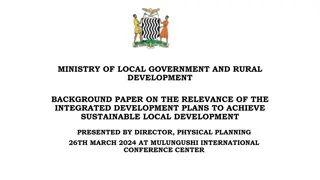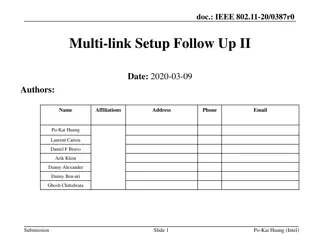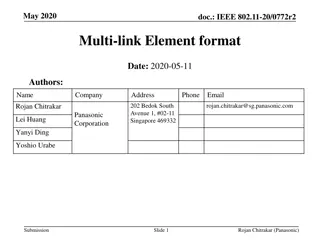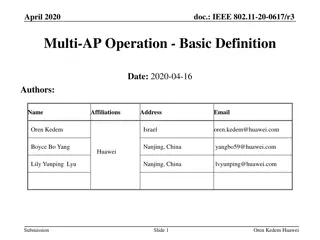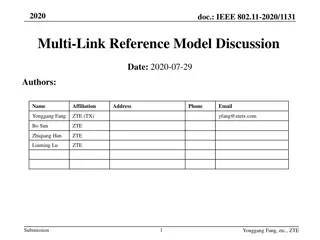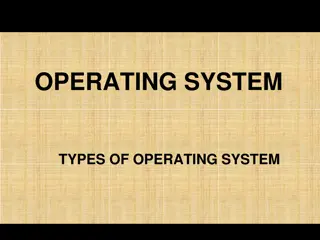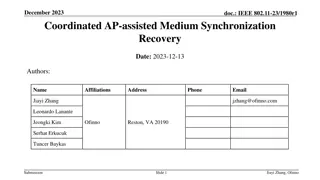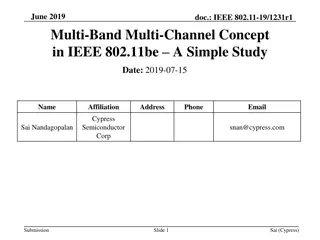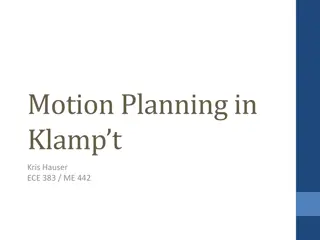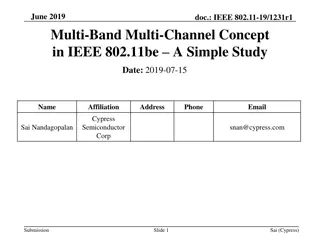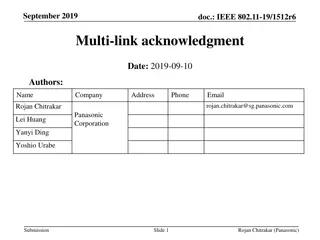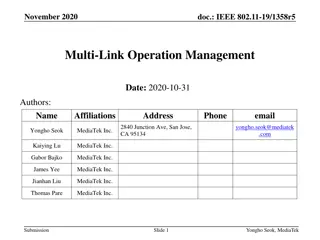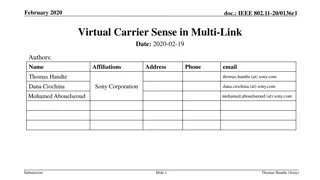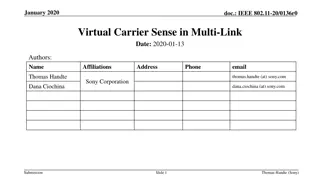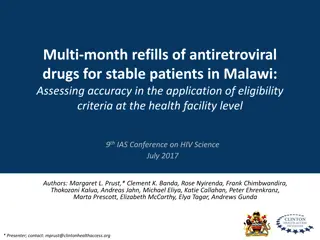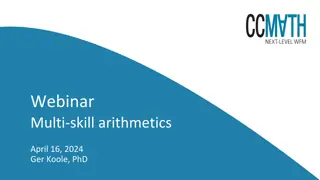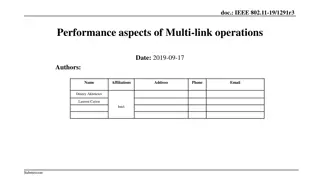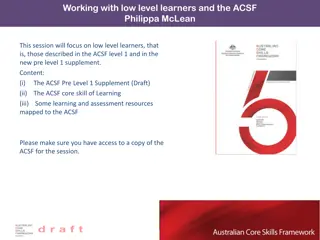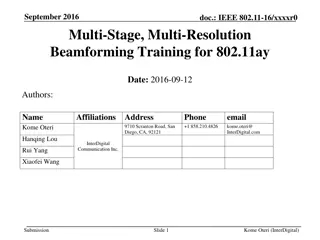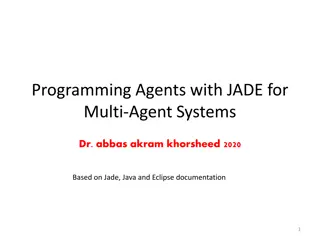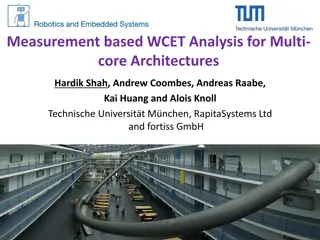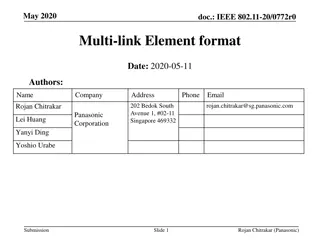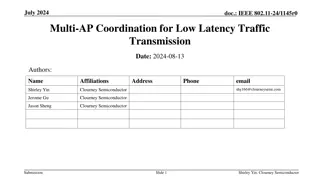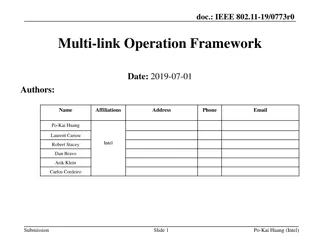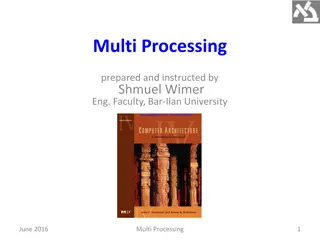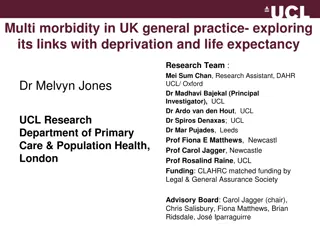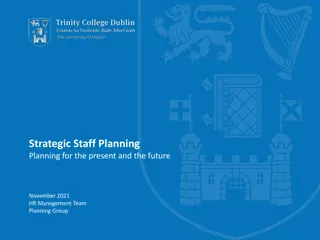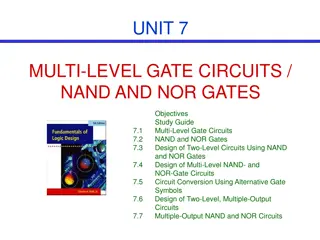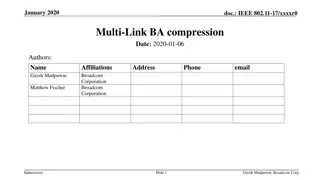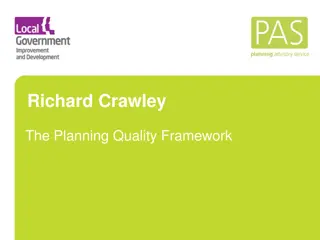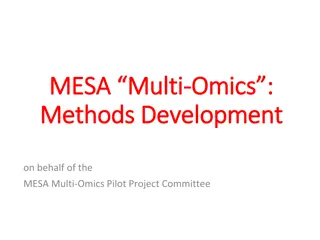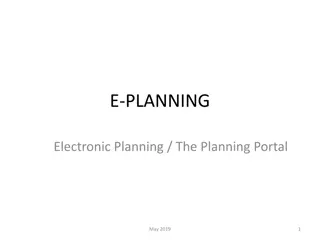Enhancing Local Development Through Integrated Planning: A Critical Analysis
The background paper explores the relevance of integrated development plans for achieving sustainable local development in Zambia. It highlights weaknesses in national development plans, development coordinating committees at provincial and district levels, and district-level spatial plans. The intr
0 views • 13 slides
Progress on IEEE 802.11 Multi-link Setup
Significant developments have been made in the multi-link setup within the IEEE 802.11 framework. The focus is on allowing only one STA in the MLD framework, differentiation with STA-level associations, and the rationale behind restricting to one STA. Proposals for defining multi-link devices and re
0 views • 12 slides
Evolution of Multi-Level Planning in India
Explore the historical background and stages of multi-level planning in India, from the national level to the grassroots Panchayat level. Learn about the transition from the Planning Commission to NITI Aayog at the national level and the crucial role of state Planning Boards in coordinating developm
0 views • 13 slides
IEEE 802.11-20/0772r2 Multi-Link Elements Overview
IEEE 802.11-20/0772r2 discusses various aspects of multi-link elements in the context of IEEE 802.11 standards. The document covers the need for efficient element ID extension, different multi-link element structures, including authentication algorithms, common controls, and sub-elements organizatio
1 views • 10 slides
Multi-AP Operation in IEEE 802.11-20-0617/r3
Explore the basic definitions and key features of Multi-AP operation in the IEEE 802.11 standard. Learn about Multi-AP Candidate Set (M-AP-CS) and Multi-AP Operation Set (M-AP-OS) along with their participants and formation. Delve into the concepts of Coordinator AP, Coordinated AP(s), and reliable
0 views • 19 slides
IEEE 802.11-2020 Multi-Link Reference Model Discussion
This contribution discusses the reference model to support multi-link operation in IEEE 802.11be and proposes architecture reference models to support multi-link devices. It covers aspects such as baseline architecture reference models, logical entities in different layers, Multi-Link Device (MLD) f
3 views • 19 slides
Different Types of Operating Systems
An operating system is the crucial program that manages a computer's resources and acts as an interface between the user and the machine. Various types of operating systems exist, including real-time, multi-user vs. single-user, multi-tasking vs. single-tasking, distributed, and embedded systems. Re
1 views • 11 slides
Integrated Energy Planning Workshop Overview
This content provides insights into an Energy Balance and Planning Models workshop conducted by Gabriel Hernandez, focusing on the planning process, energy planning principles, and integrated energy planning. It covers topics such as defining objectives, collecting information, scenario visualizatio
1 views • 7 slides
IEEE 802.11-23/1980r1 Coordinated AP-assisted Medium Synchronization Recovery
This document from December 2023 discusses medium synchronization recovery leveraging multi-AP coordination for multi-link devices. It covers features such as Multi-link device (MLD), Multi-link operation (MLO), and Ultra High Reliability (UHR) capability defined in P802.11bn for improvements in rat
0 views • 8 slides
Multi-Band Multi-Channel Concept in IEEE 802.11be
Exploring the benefits of Multi-Band Multi-Channel (MBMC) operation in IEEE 802.11be, this study delves into the efficient use of spectrum, increased data rates, and network load balancing. It also discusses the envisioned usage models and compares Single Band Operation with Multi-Band Operation, hi
3 views • 20 slides
Motion Planning in Klamp't: Overview and Key Concepts
Motion Planning in Klamp't covers key concepts such as C-Space and robot-level abstractions, planning algorithms, toolkit components, and the kinematic planning pipeline. It compares to other packages like OMPL, MoveIt!, and OpenRAVE, offering PRM-style planners at the C-Space level and support for
0 views • 26 slides
Multi-Band, Multi-Channel Concept in IEEE 802.11be
Explore the advantages of Multi-Band, Multi-Channel (MBMC) operation in IEEE 802.11be, focusing on efficient spectrum use, increased data rates, and dynamic band switching. Learn about usage models and compare with single-band operations. Discover how MBMC enables concurrent operation across multipl
0 views • 22 slides
Enhancing IEEE 802.11 with Multi-Link Acknowledgment Mechanism
This document explores the concept of multi-link transmission in IEEE 802.11 networks as a means to enhance peak throughput. It delves into the proposal of a multi-link block acknowledgment mechanism for more efficient data transmission. The discussion includes details on existing block acknowledgme
0 views • 16 slides
IEEE 802.11-20/0370r0 Multi-link Power Save Discussion
The document discusses multi-link power saving in the IEEE 802.11be standard. It reviews extreme low power multi-link operation modes, emphasizing the importance of enabling a single link for practical power savings. The proposed extreme low power mode introduces fixed and dynamic anchor links for e
0 views • 11 slides
Strategic Planning for Sustainable Development: A Comprehensive Overview
Planning and strategic planning play crucial roles in achieving sustainable development goals. This presentation delves into the concepts of planning, strategic planning, sustainable development, the SDGs, types of planning, steps in the strategic planning process, and the importance and challenges
0 views • 20 slides
IEEE 802.11-19/1358r5 Multi-Link Operation Management Overview
This document provides insights into the multi-link operation management proposed for IEEE 802.11-19/1358r5 standard by MediaTek Inc. The concept involves handling multi-link entities, such as APs and STAs, for improved performance in different environments. It discusses the architecture, motivation
0 views • 15 slides
Virtual Carrier Sense in Asynchronous Multi-Link Networks
Exploring the implementation of virtual carrier sense in asynchronous multi-link networks based on IEEE 802.11 standards. The presentation discusses the benefits of using NAV (Network Allocation Vector) in asynchronous multi-link setups to avoid hidden node issues, improve throughput, and latency. I
0 views • 16 slides
Virtual Carrier Sense in Multi-Link Networks
This document discusses the implementation and advantages of virtual carrier sense in multi-link networks under the IEEE 802.11 standard. It explores the operation of multi-link setups, asynchronous communication benefits, and the necessity of multiple contention channels. The concept of NAV (Networ
2 views • 11 slides
Accuracy of Multi-Month Refills of Antiretroviral Drugs in Malawi
Understanding the implementation of multi-month refills for stable patients in Malawi provides valuable insights into patient eligibility differentiation, with 86% eligible for multi-month scripts. Challenges remain in accurately applying eligibility criteria, as seen in the study's findings. The re
1 views • 13 slides
Multi-Skill Arithmetics: Insights and Challenges
Delve into the intricacies of multi-skill operations in the webinar presented by Ger Koole, PhD. Explore the advantages and complexities, learn rules of thumb for multi-skill calculations, and understand the trade-offs involved in managing multi-skilled teams efficiently.
0 views • 11 slides
Performance Aspects of Multi-link Operations in IEEE 802.11-19/1291r0
This document explores the performance aspects, benefits, and assumptions of multi-link operations in IEEE 802.11-19/1291r0. It discusses the motivation for multi-link operation in new wireless devices, potential throughput gains, classification of multi-link capabilities, and operation modes. The s
1 views • 30 slides
Performance Aspects of Multi-link Operations in IEEE 802.11-19/1291r3
This document discusses the motivation, assumptions, and classifications related to multi-link operations in IEEE 802.11-19/1291r3 standard. It explores the benefits of multi-link capabilities in new wireless devices, such as improved throughput, reduced latency, and potential for link aggregation.
0 views • 18 slides
Supporting Low-Level Learners with ACSF: A Focus on Pre-Level 1 Skills
This session delves into assisting low-level learners based on the ACSF level 1 and pre-level 1 supplement. It covers the ACSF Pre-Level 1 Supplement, core learning skills, and resources aligned with the ACSF. Learners at this level show readiness for learning but may need varying levels of support
0 views • 20 slides
Multi-Stage, Multi-Resolution Beamforming Training for IEEE 802.11ay
In September 2016, a proposal was introduced to enhance the beamforming training procedures in IEEE 802.11ay for increased efficiency and MIMO support. The proposal suggests a multi-stage, multi-resolution beamforming training framework to improve efficiency in scenarios with high-resolution beams a
0 views • 11 slides
Programming Agents with JADE for Multi-Agent Systems Overview
This overview delves into the setup of JADE framework for developing multi-agent systems. It covers essential components, setting up the development environment, installing JADE and Eclipse, and a book trading example. The content explores the power of Java technology, Eclipse as an extensible devel
1 views • 51 slides
Measurement-based WCET Analysis for Multi-core Architectures
This research focuses on providing an inexpensive multi-core solution for safety-critical systems by utilizing unmodified production chips and measurement-based WCET analysis tools. The goal is to enable WCET analysis on multi-core setups while preserving cost, performance, and time-to-market benefi
0 views • 25 slides
The Planning Advisory Service: Key Facts and Recommendations
The Planning Advisory Service (PAS) is a vital resource for local planning authorities, funded by DCLG and established in 2004. This service aims to enhance planning services, drive improvements, and navigate changes within the planning system. PAS supports, promotes, and innovates planning practice
0 views • 28 slides
Proposal for Common Multi-link Element in IEEE 802.11-20/0772r0
Various multi-link elements have been proposed in IEEE 802.11 standards, leading to potential space limitations. The proposal suggests a common multi-link element with a Type field to distinguish different usages efficiently, potentially streamlining multi-link operations without unnecessary complex
0 views • 9 slides
Multi-AP Coordination for Low Latency Traffic Transmission
The document discusses the integration of multi-access point (AP) coordination to enhance the transmission of low-latency traffic in wireless networks. It addresses the challenges and introduces modes of operation capable of reducing latency and improving reliability for low-latency (LL) traffic tra
0 views • 9 slides
IEEE 802.11-19/0773r0 Multi-link Operation Framework Summary
The document discusses the multi-link operation framework for IEEE 802.11-19/0773r0, focusing on load balancing and aggregation use cases. It introduces terminology related to multi-link logical entities and provides examples of multi-link AP and non-AP logical entities. The framework considers stee
0 views • 16 slides
Multi-Processing in Computer Architecture
Beginning in the mid-2000s, a shift towards multi-processing emerged due to limitations in uniprocessor performance gains. This led to the development of multiprocessors like multicore systems, enabling enhanced performance through parallel processing. The taxonomy of Flynn categories, including SIS
0 views • 46 slides
Multi-morbidity and Deprivation in UK General Practice
Exploring the association between multi-morbidity, deprivation, and life expectancy in the context of UK general practice. The research aims to quantify socio-economic inequalities in chronic disease onset and life expectancy, particularly among older populations with multi-morbidity. Methods includ
0 views • 27 slides
Strategic Staff Planning for Future Success
Strategic Staff Planning involves aligning workforce to future goals through short and long-term approaches. It includes 3 Horizons, Operational Workforce Planning, and Strategic Workforce Planning to ensure capabilities match organizational strategies. The process spans from tactical short-term pla
1 views • 9 slides
Design of Multi-Level Gate Circuits Using NAND and NOR Gates
Explore the design and analysis of multi-level gate circuits using NAND and NOR gates, including two-level and multiple-output circuit design. Learn about circuit conversion, alternative gate symbols, AND-OR, OR-AND configurations, and factorization of multi-level gate circuits. Dive into examples a
0 views • 28 slides
IEEE 802.11-17: Enhancing Multi-Link Operation for Higher Throughput
The document discusses IEEE 802.11-17/xxxxr0 focusing on multi-link operation for achieving higher throughput. It covers motions adopted in the SFD related to asynchronous multi-link channel access, mechanisms for multi-link operation, and shared sequence number space. Additionally, it explores the
0 views • 14 slides
Overview of DICOM WG21 Multi-Energy Imaging Supplement
The DICOM WG21 Multi-Energy Imaging Supplement aims to address the challenges and opportunities in multi-energy imaging technologies, providing a comprehensive overview of imaging techniques, use cases, objectives, and potential clinical applications. The supplement discusses the definition of multi
0 views • 33 slides
Transformational Change in ASN Head Teachers Meeting - November 12, 2015
Meeting held on November 12, 2015, focused on proposing new planning pathways for children needing additional support in learning. The reasons for change included mainstream development, inadequacy of current systems, and the need to enhance support in mainstream schools. A new model was suggested i
0 views • 10 slides
Challenges in Government Planning: The Importance of Quality Frameworks
Research by Richard Crawley highlights concerns regarding government planning performance targets leading to perverse behavior and the need for a focus on good practices in local planning authorities. The Planning Advisory Service (PAS) since 2009 has been facilitating benchmarking to improve planni
0 views • 8 slides
Advancing Multi-Omics Research with Integrated Methods
Exploring the importance of multi-variate methods in multi-omics research to integrate diverse datasets such as phenotypes, metabolites, expression, methylation, and SNPs. The overview covers matrix-based methods, sparse methods for feature selection, and an example analysis from the MESA Multi-Omic
0 views • 17 slides
E-Planning: Revolutionizing Planning Processes with Online Functionality
E-Planning is a transformative initiative aimed at streamlining planning processes through the introduction of online services for planning applications, submissions, and payments. The project, established in 2016, focuses on enhancing efficiency and customer service in the planning sector. Applican
0 views • 17 slides
